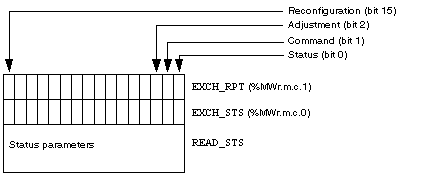When data is exchanged between the PLC memory and the module, the module may require several task cycles to acknowledge this information. All IODDTs use two words to manage exchanges:
NOTE: Depending on the localization of the module, the management of the explicit(%MW0.0.MOD.0.0 for example)will not be detected by the application:
-
for in-rack modules, explicit exchanges are done immediately on the local PLC Bus and are finished before the end of the execution task, so the READ_STS,for example, is always finished when the%MW.0.0.MOD.0.0 bit is checked by the application.
-
for remote bus (Fipio for example ), explicit exchanges are not synchronous with the execution task, so the detection is possible by the application.
The illustration below shows the different significant bits for managing exchanges:
Description of Significant Bits
The rank 0 bits of the words EXCH_STS (%MWr.m.c.0) and EXCH_RPT (%MWr.m.c.1) are associated with the status parameters:
-
The STS_IN_PROGR bit (%MWr.m.c.0.0) indicates whether a read request for the status words is in progress.
-
The STS_ERR bit (%MWr.m.c.1.0) specifies whether a read request for the status words is accepted by the module channel.
Execution Indicators for an Explicit Exchange: EXCH_STS
The table below shows the EXCH_STS (%MWr.m.c.0) explicit exchange control bits:
|
Standard symbol
|
Type
|
Access
|
Meaning
|
Address
|
|
STS_IN_PROGR
|
BOOL
|
R
|
Reading of channel status words in progress
|
%MWr.m.c.0.0
|
NOTE: If the module is not present or is disconnected, explicit exchange objects (READ_STS, for example) are not sent to the module (STS_IN_PROG (%MWr.m.c.0.0) = 0), but the words are refreshed.
Explicit Exchange Report: EXCH_RPT
The table below presents the EXCH_RPT (%MWr.m.c.1) report bits:
|
Standard symbol
|
Type
|
Access
|
Meaning
|
Address
|
|
STS_ERR
|
BOOL
|
R
|
Detected error reading channel status words
(1 = failure)
|
%MWr.m.c.1.0
|
